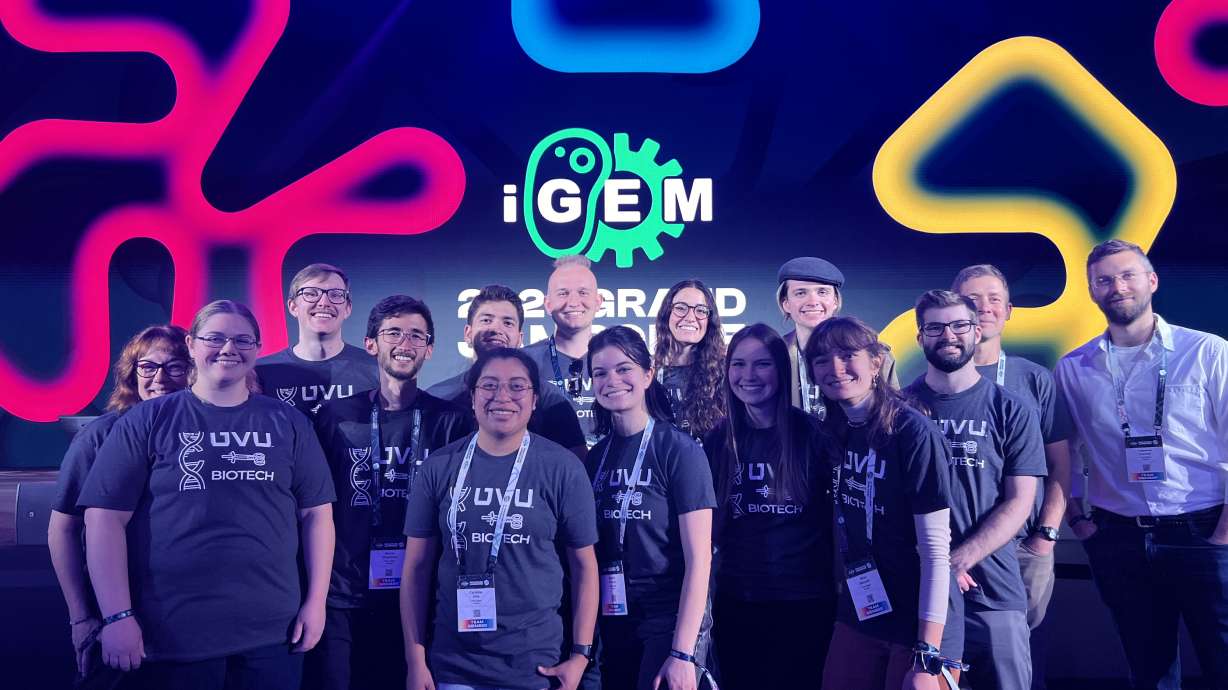Estimated read time: 4-5 minutes
This archived news story is available only for your personal, non-commercial use. Information in the story may be outdated or superseded by additional information. Reading or replaying the story in its archived form does not constitute a republication of the story.
OREM — A team of Utah Valley University students recently won an international competition in Paris for its genetically modified algae that could act as a sponge to soak up toxins and prevent harmful algal blooms in the Utah Lake.
"It's a shame to live so close to such a pretty lake that happens to be full of toxic algae blooms most of the time," UVU biotechnology major Elise Bennett said.
That is exactly the problem a team of 13 students and two professors tried to tackle with genetic modification.
The students took the algae chlamydomonas reinhardtii, or as they affectionately named it "Chlammy," and modified it to work like a sponge. Utah Lake has an excess of phosphorus and nitrogen which leads to negative impacts in the lake as oxygen is depleted.
Chlammy, "a cute little algae" as Bennett called it, already uptakes phosphates and nitrates but the students genetically engineered it to absorb even more. They also used genes from a bacteria so instead of the algae creating ammonia in the process of absorbing, it releases dinitrogen, a harmless gas that already comprises 75% of the atmosphere.
"We take its natural processes and we change them just slightly to be able to work better in our favor," Bennett said.
The project was titled Bloom B Gone and according to the project's website, the algae's sponge effect "will reduce the nutrient loading in Utah Lake and help prevent harmful algal blooms."
In November, the Bloom B Gone team won a silver medal at the International Genetically Engineered Machine Jamboree competition in Paris. The event had over 400 teams from 50 different countries who presented their genetically engineered organisms aimed at solving local problems.

Teams were judged on their construction process of the engineered organism, how well it could address a problem and how the team connected with the community through education and outreach. Bennett said it was a huge career-building moment for her to be part of this project.
"It's not in every classroom that you can go and genetically modify organisms to solve local problems. It's usually for class work but this was really a student-driven effort to solve something we're all passionate about," she said.
"It was really incredible having UVU there," Bennett said. Few U.S. schools got to go to the competition and so the UVU students were rubbing shoulders with people from Yale, Harvard, Stanford and other Ivy League schools.
"That was really, really cool to see that we were able to compete with these much bigger names and show off a product that is still up to their level," she said.
Bennett said the bloom team started discussions in April where they brainstormed several potential solutions for various local problems until they decided to pursue their sponge-algae. During fall semester, the students were in the lab every day trying to make the algae accept the new DNA and express the intended genes.
The team members went to the Utah Lake Festival in June to discuss their project and help show people that genetic modification doesn't have to be a scary idea but can be a new tool for solutions.
Bennett said the algae is still a work in progress and in the testing stages. For now, the team will continue growing the algae so it can have enough to monitor how efficient the algae-sponge is at soaking up the nutrients so the students can collect conclusive data.

She said the algae has shown some expression of the desired genes, but there isn't a complete picture yet of whether it could be viable for use in water treatment facilities.
"UVU is about five to 10 minutes from Utah Lake's shores, so something that is so close to our hearts and our home could really use a solution to allow us to make better use of the lake and bring tourism to it and recreation," she said. "We are undergraduates and we wanted to try something really hard and we were successful."
She said the project is important because it shows trying to find something no one has tried before leads to innovative solutions.
"Allowing for research to happen at an undergraduate level allows for new ideas that maybe won't be sturdy — we might get answers, we might not. It might be the most tedious work you have ever done but it's also the most rewarding work you have ever done," she said.
"We don't really look to synthetic biology as often (for solutions) because that name kinda has a negative connotation to a lot of people. I think this project is important because it shows what we can do when we try things that might not work, but might work. And might be a step in the right direction if anything," she said.
It's also crucial to grow positive connections with the community so that further research and testing can be done and public opinion can be positive, she added.
Bennett will soon be starting on a new project for next year's jamboree and said hopefully, they'll bring home a gold.










